"March Attack" Incar Ukraina, Suriah & Venezuela
http://www.islamtimes.org/vdcfx0dmvw6dvva.,8iw.html
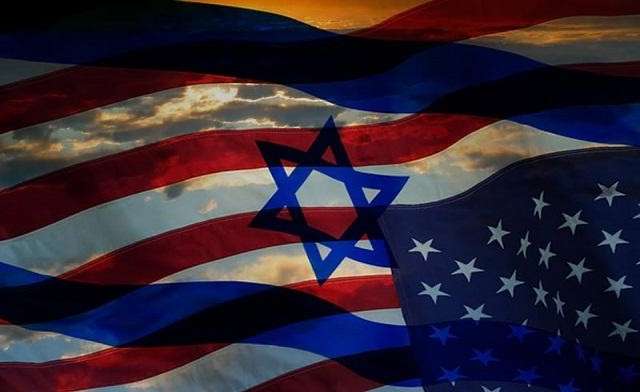
AS-Israel
Pada 1930, terdapat fakta terkenal, saat mana pemerintah Jerman Adolf Hitler memilih bulan Maret (Ides of Mars), untuk melakukan gerakan paling berani demi menegaskan kembali bangsanya sebagai kekuatan kontinental, yang memuncak pada perang paling mematikan dalam sejarah.
Demikian ungkap analis perang dan kritikus keras kekaisaran fasis AS-NATO, Rick Rozoff.
Sebagai contoh, lanjutnya:
1. Maret 1933, pemilu federal Jerman membawa Hitler berkuasa sebagai kanselir.
2. Maret 1936, Jerman memiliterisasi kembali Rhineland sekalipun bertentangan dengan Perjanjian Versailles.
3. Maret 1937, Legiun Condor Reich Ketiga mengebom dan menyerang Durango, Spanyol dan bulan berikutnya mengebom Guernica.
4. Maret 1938, Jerman mencengkram Austria.
"Selama lima belas tahun terakhir," ujar Rozoff, " pola yang tidak jauh berbeda telah muncul."
1. Maret 1999, AS dan Pakta Pertahanan Atlantik Utara (NATO) memulai Operasi Pasukan Sekutu berupa perang udara 78 hari melawan Republik Federal Yugoslavia.
2. Maret 2003, AS dan beberapa sekutu NATO-nya memulai "Operasi Pembebasan Irak" berupa invasi dan pendudukan Irak, yang melibatkan prajurit dari 23 negara anggota NATO yang jumlahnya 28 negara.
3. Maret 2011, AS melancarkan "Operasi Odyssey Dawn", yang 19 hari kemudian diambil alih NATO dengan kode "Operation Unified Protector" berupa perang udara dan blokade laut Libya yang memakan waktu lebih dari enam setengah bulan.
Semua itu, lanjutnya, merupakan perang pertama yang pernah dilakukan NATO dan, masing-masingnya adalah perang pertama di tiga benua: Eropa, Asia, dan Afrika. "Dalam rangkaian perang langsung, rahasia, dan proksi yang tak henti-hentinya dilancarkan AS dan NATO sejak serangan terhadap Yugoslavia pada 24 Maret 1999, negara-negara dan mantan negara berikut mengalami luka serius, lebih tepat lagi, fatal. Hancur," papar Rozoff.
Berikut negara-negara ayng dimaksud:
1. Republik Federal Yugoslavia (yang kemudian sampai sekarang terpecah menjadi tiga entitas: Negara Uni Serbia, Montenegro, dan Macedonia).
2. Afghanistan (apa yang tersisa darinya setelah AS dan beberapa sekutu NATO-nya mendukung pemberontakan fundamentalis-ekstremis yang beroperasi dari Pakistan sejak 1978-1992 dan kemudian diam-diam mendukung pengambilalihan Taliban pada 1995-1996).
3. Irak
4. Somalia
5. Pantai Gading
6. Libya
7. Yaman
8. Suriah
9. Sudan
10. Mali
11. Ukraina
12. ?? (IT/GR/rj)
The cultural heart of Syria: deeply fractured but resilient

A painting by Syrian artist Mohannad Orabi. Profile Portrait, 2012, Mixed Media on Canvas,
150 x 150 cm.
It has been three years since March 15, 2011. The Syrian
uprising has turned into rivers of blood, sweeping along with them
thousands of casualties. Not even Scheherazade would be able to recount
every tale from the Syrian inferno. But how has this affected the
intellectual exchange in Syria? Have the ideas born out of the crisis
been able to capture the magnitude of the catastrophe unfolding in the
country?
Damascus –
Never before has the Syrian intellectual
community been so torn as it is today. Shortly before the uprising in
Syria, no one would have imagined that Walid Ikhlasi would desert the
streets of Aleppo to settle in Somalia, contemplating the pirate boats
there instead of the magnificent stones in Aleppo’s citadel, or that
Firas al-Sawah would seek asylum in China, to finish his translation of
Tao Te Ching by Laozi.
No one could
have predicted either that Nazih Abu Afash would abandon his Damascene
isolation for Beirut, or for Saleh Almani and Assem al-Basha to cross
the Mediterranean to Andalusia.
The list of such brilliant and celebrated émigrés is almost endless.
Perhaps we need to consult cartographers to get an idea of the places
that dozens of Syrian artists, writers, and intellectuals have now
journeyed to around the world.
But are they exiles, immigrants, or refugees fleeing hell? No
decisive answers can be expected from a country now plagued by trenches,
barricades, and bullets. It is difficult to come to terms with the
shifts in Syria, with secularists now defending sectarian lines,
pan-Arabists defending tribes and clans, and post-modern thinkers
polemicizing on the specificities of their religious denominations.
All this has happened over the past one thousand days. Not even the
mythical Scheherazade would be able to account for all the stories of
the ongoing bloodshed. Meanwhile, many of Syria’s intellectuals, as they
sail for a fictitious Ithaca in a punctured boat with their
Shakespearean delusions, have failed to answer one fundamental question:
How can you make a revolution there, having fled its flames here?
The question, for the time being, will remain hanging in the air,
amid mutual accusations and sharp polarization. To be sure, mutual
mistrust is almost the only currency in circulation in the country’s
cultural scene today.
With this in mind, we may need to scour the Internet to learn the
extent of the bone-breaking battles taking place among the virtual
belligerents, while the body count only grows.
Yet one should not take too seriously the queues of unemployed and
unimaginative pundits who operate through small-time outfits like the
mushrooming websites, provincial newspapers, and fictitious human rights
organizations, or the hastily made films, nebulous think tanks, and new
titles displayed before their names on television screens. How many
novelists have now become military experts, how many little-known poets
have become thinkers, and how many army deserters have now become judges
of morality and good conduct?
The issue is complicated, much more than some believe it to be, in a
country that has lost its prestige and many of the hallmarks of its
ancient civilization. Syria now stands exposed to barbarism, picked off
by hyenas and foxes on both sides of the divide, and by their caustic
and vitriolic discourse.
Syria is now a naked country, covered by nothing other than a mantle
of hatred, revenge, and personal vendetta, with many of its children
engaged in a dramatic process of realigning themselves in accordance
with pure whim, opportunism, or expediency. The secularist intellectual
now vacillates from support for religious rule to support for military
rule as personal interest dictates, without regard for the damage and
death around them and because of them.
This is how newcomer intellectuals came to the forefront, having been
tempted by both the revolution and their ego. Often they have nothing
to show for other than their Facebook glories, which attract hundred of
“likes” in mere minutes for criticizing tyranny – remotely. No known
intellectuals can measure up to such “success.”
Some
Syrian intellectuals, in three years of conflict, proceeded to craft a
sharp ax to uproot yesterday’s culture with all its symbols and icons in
mere minutes, in response to the new “scorched-earth” zeitgeist. One
such intellectual even wrote a candid airing of regret, for having
visited the grave of Saadallah Wannous years ago. One who once boasted
of having his picture taken with the poet Adonis at a poetry festival,
is now dedicated to criticizing him on the grounds that he is a defender
of the regime, all while such people fight their wars far from home,
probably in their sleeping clothes.
Syria’s intellectual wars have not been confined to the back alleys
either, but have also reached major arenas. Consider for example the
secular thinker Sadeq Jalal al-Azm, who has been invoking the
“oppression of the Sunnis” from his exile in what is a clear dig at
Adonis and his attitudes. Meanwhile, some have denounced granting Nazih
Abu Afash the Owais Cultural Award, though until recently, it was for
these same people a “suspicious oil-tainted award.”
Despite these destructive wars that use the keyboard as a kind of a
melee weapon, Damascus is trying to tend to its wounds, scars, and long
ordeal, with what is left of its intellectuals, away from the official,
chronically anemic culture.
A number of independent literary, theatrical, and musical forums have
been popping up in many neighborhoods in the Syrian capital. They want
to restore hope to the city that has been torn by intermittent shelling
and the proliferation of checkpoints that have carved out Damascus,
while others are working hard on examining the country’s geography with a
view to dust off Sykes-Picot and redraw its borders.
Before Lawrence of Arabia blew up the Damascus-Haifa-Hejaz railway,
Ibn Jubair had once described the city as the “Paradise of the Orient.”
But is it so, or is it a paradise for barbarians? Do we have to revere a
poorly written text just because it endorses revolution? Do we have to
renounce the pristine cultural edifices of the country, for the same
reason, in the absence of solid foundations for these post-revolutionary
works? Or should we wait a while, for what the war will ultimately
produce, beyond the absurdity of the present?
Perhaps what Syrian culture needs, at the present time, is to shake
off the intruders from the scene, here and there, and at home and
abroad, and prune its fields from harmful weeds that grew in the wasted
time. Perhaps it should focus on the voice of reason alone, with
creative awareness that can restore Maari’s severed head, and Abu
Tammam’s statue, to their rightful place in the collective memory. And
perhaps it should reverse the tide of mistrust, taboos, and mutual
verbal abuse, so that Syria can breathe a different air, uncontaminated
by ready-made judgments, shaken identities, and inflated egos.
Syrian army prepares offensive against Qalamoun mountains

Syrian
government forces rest on a street in the Syrian town of Yabrud on
March 16, 2014 after they seized full control of the rebel bastion in
the strategic Qalamoun region near the Lebanese border. (Photo: AFP -
Joseph Eid)
Syrian army forces were Monday readying an assault on the last
rebel-held areas in the Qalamoun mountains, located on the Lebanese
border, after overrunning key opposition bastion Yabrud.
The capture on Sunday of Yabrud by Syrian troops and fighters of
Lebanon's Hezbollah marked a significant setback for the rebels as it
severs their important supply lines from across the Lebanese border.
"The army will under the battle plan launch operations in all areas
where terrorists are to be found," a security source in Damascus told
AFP.
These included Rankus, south of Yabrud, and Ras al-Maarra and Flita, northwest of the town.
"The aim of the army operation is to entirely secure the border and to close all corridors to Lebanon," the source added.
An AFP reporter entered Yabrud, north of Damascus, after the army on Sunday declared it had seized full control of the town.
Exhausted Syrian soldiers sat in the streets after seizing the town
in fierce clashes with the support of battle-hardened fighters from
Lebanon' Hezbollah movement.
"It was a very difficult battle, possibly the most difficult we have
faced," a soldier who identified himself as Abu Mohammed told AFP in
Yabrud's central square between puffs from a water-pipe.
In a spillover of violence, a suicide car bombing killed at least two
people late Sunday in the Bekaa Valley near the Syrian border.
The attack was claimed by al-Nusra Front in Lebanon, which described
it as a "quick response to the bravado... of the party of Iran
(Hezbollah) for their rape of Yabrud."
Earlier, another extremist group, Liwa Ahrar al-Sunna, had also taken
responsibility for the attack, describing it as "revenge for Yabrud."
The fall of Yabrud comes after months of Syrian army operations in
the Qalamoun region. Late last year, the army captured a string of
nearby towns before turning its sights on Yabrud.
The town was once home to some 30,000 people, including a Christian
minority, and had been a rebel bastion since early in the Syrian
uprising that began in March 2011.
Yabrud is a strategic prize because of its proximity to the highway
and the Lebanese border, across which rebels have smuggled fighters and
weapons.
Hezbollah's involvement in Syria has prompted bomb attacks by
extremist groups against areas in Lebanon sympathetic to the party,
killing mostly civilians.
The group and Lebanese security forces have said many of the car bombs used in those attacks originated in Yabrud.
(AFP, Al-Akhbar)Lebanon: Geagea ready for serious dialogue with Hezbollah

Head of the Lebanese Forces, Samir Geagea. (Photo: Marwan Tahtah)
Head of the Lebanese Forces, Samir Geagea, expressed in an interview with Al-Akhbar
his willingness to engage in a serious dialogue with Hezbollah as long
as it is not a waste of time. His new position comes after his possible
bid to run in the presidential elections, which he calls the “mother of
all battles.”
There are two issues that Samir Geagea, the head of the Lebanese Forces, focuses on in his conversation: the presidential elections, which he calls the “mother of all battles” for March 14, and the current government and its ministerial statement which, he argues, resembles its predecessor headed by former Prime Minister Najib Mikati. Geagea takes aim at the ministerial statement and at the government, which his party will not give a vote of confidence to in parliament. But the head of the Lebanese Forces, who sparked the presidential battle on the March 14 anniversary and emerged as a possible presidential candidate, voices in his interview with Al-Akhbar a more mature position towards Hezbollah with whom there is “no personal or sectarian dispute” but differences in political views. Geagea expressed his willingness to engage in a “serious dialogue” with Hezbollah. Geagea is using a new, serious tone of voice with the Resistance but his offer of dialogue is conditional.
We begin our conversation with the developments of the Yabroud battle and its impact on Lebanon. Geagea says: “The first outcome might be closure of the area that was the source of car bombs to Lebanon. But on the other hand, the celebrations that we witnessed in Lebanon are improper and Hezbollah’s participation in them and in the battle of Yabroud are going to increase the number of people who want to target it. I call on the Lebanese government to take all necessary measures to ward off the dangers stemming from this development.”
On the possibility of the influx of Syrian opposition fighters into Lebanon and the impact that it would have on the Bekaa valley, Geagea replies: “I don’t believe that would happen. The Lebanese army is present in the area and I don’t think fighters will come in large numbers to Lebanon. In addition, the local authorities in Arsal rejected this prospect because they realize what that would mean.”
Geagea does not link the deterioration of the situation in Tripoli and what is happening on the border along the northern Bekaa, “The reason for what is happening in Tripoli is the absence of political will. The situation in Syria does not impact Jordan and Turkey for example. What is needed is for the government to implement a clear policy in Tripoli and not act as though it were UNIFIL (United Nations Interim Forces in Lebanon). It is not acceptable that the country continues to be under the mercy of armed factions.”
What does he have to say about the government, which he has a clear position on, after the ministerial statement? Geagea answers: “Practically the speaking, the government policy in its ministerial statement resembles the policy of the previous government.
First, regarding the section on the Resistance, it appears that the government decided to privatize its strategic position because it gave an opportunity for every group to arm itself under the pretext of resistance. What is to prevent a group of citizens from Jbeil or Tripoli or Hasbiah from arming itself to resist the occupation and what would the government do then? It is an undefined and bizarre formula that not only maintains existing militias but also allows more militias to emerge under the pretext of resistance. Second, I deeply regret that the Baabda Declaration was not clearly mentioned. What was stated in terms of respect for international decisions and national dialogue was done in general terms that mean nothing in reality. If the Baabda Declaration were not important, it would not have been rejected by some parties. That is why it should have been mentioned word for word with all its provisions.
To sum up my position, the ministerial statement preserved the Resistance and did not include the Baabda Declaration.
I also have two other observations. One, the Special Tribunal for Lebanon (STL) is absent from the ministerial statement even though its name is linked to Lebanon. Two, while I was very happy when I read that the government vowed to follow up on the case of Imam Moussa al-Sadr, I was sad that it ignored the fate of Lebanese citizens who went missing in Syria even though we saw yesterday the revelation about the execution of four Lebanese detainees that Assad’s deceitful regime had not declared.”
Will the Lebanese Forces MPs give the government a vote of confidence? Geagea replies: “The Lebanese Forces MPs will not boycott the parliamentary session. They will take part and will discuss the ministerial statement but we will not give a vote of confidence.”
What about the repercussions of giving a vote of no confidence to a government that includes the Lebanese Forces’ allies such as the Future Movement and the Phalange Party? Geagea answers: “The government does not include these parties only. We are not going to give a vote of confidence to the government as a whole. Our political relationship as allies continues and we are always in contact. But the Future Movement and the Phalange made up their mind and decided to participate in the government for reasons that are well-known.”
Moving on to the question of the presidential elections, we asked Geagea about his speech at the Biel celebration which appeared to announce his candidacy. He answered: “I put an objective roadmap around two points. One, the need for March 14 to engage in the presidential elections very seriously, otherwise, how are they going to achieve their goals. This is an opportunity that presents itself once every six years and if we don’t know how to fight it right, we will lose this chance. Two, I outlined the makings and objective standards of candidates because these standards are objective and scientific and I am open to discussing them.”
Have you started devising a practical plan for the elections? He says: “Four months ago, we began to act and make contacts. The presidential election is the mother of all battles as far as we are concerned. Unlike what some say about the president not having powers, we believe he does have powers. He is the symbol of the country and his words are heard. Countries deal with him on this basis. If it weren’t the case, all hell would not have broken loose against the president when he made statement that some people did not like. The presidential elections should be the mother of all battles for March 14.”
You have devised a roadmap for your candidacy but what is it that brings you - if you become the March 14 presidential candidate - and Hezbollah together given that the relationship between the two of you is tense? He answers: “There is no tension with Hezbollah. The differences between us are not personal or sectarian. We have different points of view because I believe what the party is doing will lead to a disaster. Differences in opinion exist between all political parties.”
There are two issues that Samir Geagea, the head of the Lebanese Forces, focuses on in his conversation: the presidential elections, which he calls the “mother of all battles” for March 14, and the current government and its ministerial statement which, he argues, resembles its predecessor headed by former Prime Minister Najib Mikati. Geagea takes aim at the ministerial statement and at the government, which his party will not give a vote of confidence to in parliament. But the head of the Lebanese Forces, who sparked the presidential battle on the March 14 anniversary and emerged as a possible presidential candidate, voices in his interview with Al-Akhbar a more mature position towards Hezbollah with whom there is “no personal or sectarian dispute” but differences in political views. Geagea expressed his willingness to engage in a “serious dialogue” with Hezbollah. Geagea is using a new, serious tone of voice with the Resistance but his offer of dialogue is conditional.
We begin our conversation with the developments of the Yabroud battle and its impact on Lebanon. Geagea says: “The first outcome might be closure of the area that was the source of car bombs to Lebanon. But on the other hand, the celebrations that we witnessed in Lebanon are improper and Hezbollah’s participation in them and in the battle of Yabroud are going to increase the number of people who want to target it. I call on the Lebanese government to take all necessary measures to ward off the dangers stemming from this development.”
On the possibility of the influx of Syrian opposition fighters into Lebanon and the impact that it would have on the Bekaa valley, Geagea replies: “I don’t believe that would happen. The Lebanese army is present in the area and I don’t think fighters will come in large numbers to Lebanon. In addition, the local authorities in Arsal rejected this prospect because they realize what that would mean.”
Geagea does not link the deterioration of the situation in Tripoli and what is happening on the border along the northern Bekaa, “The reason for what is happening in Tripoli is the absence of political will. The situation in Syria does not impact Jordan and Turkey for example. What is needed is for the government to implement a clear policy in Tripoli and not act as though it were UNIFIL (United Nations Interim Forces in Lebanon). It is not acceptable that the country continues to be under the mercy of armed factions.”
What does he have to say about the government, which he has a clear position on, after the ministerial statement? Geagea answers: “Practically the speaking, the government policy in its ministerial statement resembles the policy of the previous government.
First, regarding the section on the Resistance, it appears that the government decided to privatize its strategic position because it gave an opportunity for every group to arm itself under the pretext of resistance. What is to prevent a group of citizens from Jbeil or Tripoli or Hasbiah from arming itself to resist the occupation and what would the government do then? It is an undefined and bizarre formula that not only maintains existing militias but also allows more militias to emerge under the pretext of resistance. Second, I deeply regret that the Baabda Declaration was not clearly mentioned. What was stated in terms of respect for international decisions and national dialogue was done in general terms that mean nothing in reality. If the Baabda Declaration were not important, it would not have been rejected by some parties. That is why it should have been mentioned word for word with all its provisions.
To sum up my position, the ministerial statement preserved the Resistance and did not include the Baabda Declaration.
I also have two other observations. One, the Special Tribunal for Lebanon (STL) is absent from the ministerial statement even though its name is linked to Lebanon. Two, while I was very happy when I read that the government vowed to follow up on the case of Imam Moussa al-Sadr, I was sad that it ignored the fate of Lebanese citizens who went missing in Syria even though we saw yesterday the revelation about the execution of four Lebanese detainees that Assad’s deceitful regime had not declared.”
Will the Lebanese Forces MPs give the government a vote of confidence? Geagea replies: “The Lebanese Forces MPs will not boycott the parliamentary session. They will take part and will discuss the ministerial statement but we will not give a vote of confidence.”
What about the repercussions of giving a vote of no confidence to a government that includes the Lebanese Forces’ allies such as the Future Movement and the Phalange Party? Geagea answers: “The government does not include these parties only. We are not going to give a vote of confidence to the government as a whole. Our political relationship as allies continues and we are always in contact. But the Future Movement and the Phalange made up their mind and decided to participate in the government for reasons that are well-known.”
Moving on to the question of the presidential elections, we asked Geagea about his speech at the Biel celebration which appeared to announce his candidacy. He answered: “I put an objective roadmap around two points. One, the need for March 14 to engage in the presidential elections very seriously, otherwise, how are they going to achieve their goals. This is an opportunity that presents itself once every six years and if we don’t know how to fight it right, we will lose this chance. Two, I outlined the makings and objective standards of candidates because these standards are objective and scientific and I am open to discussing them.”
Have you started devising a practical plan for the elections? He says: “Four months ago, we began to act and make contacts. The presidential election is the mother of all battles as far as we are concerned. Unlike what some say about the president not having powers, we believe he does have powers. He is the symbol of the country and his words are heard. Countries deal with him on this basis. If it weren’t the case, all hell would not have broken loose against the president when he made statement that some people did not like. The presidential elections should be the mother of all battles for March 14.”
You have devised a roadmap for your candidacy but what is it that brings you - if you become the March 14 presidential candidate - and Hezbollah together given that the relationship between the two of you is tense? He answers: “There is no tension with Hezbollah. The differences between us are not personal or sectarian. We have different points of view because I believe what the party is doing will lead to a disaster. Differences in opinion exist between all political parties.”
But you boycotted the national dialogue because the discussion about
the defense strategy did not bear fruits with Hezbollah. He replies: “Of
course, because they did not recognize the Baabda Declaration which
means the dialogue was a waste of time. I am the first person willing to
talk to Hezbollah if the dialogue is fruitful. I know what I’m saying
and they know what I mean. Dialogue must be a serious discussion and not
a waste of time.”
Are you concerned over the possible failure to elect a president and that forming a new government and issuing its statement are a precaution against this failure? Geagea says: “I do not judge intentions and no one declared that they are planning to boycott the presidential election. We feel that there is a recognition among the March 8 and the March 14 camps of the need to have presidential elections, especially the Christian parties within both sides. This means that they are going to meet for the election session within the two months period that precedes the end of the current presidential term.”
So are there contacts between the Christian parties within the March 8 and March 14 camps to ensure that these elections will be held? Geagea replies: “Everybody is talking to everybody these days and no one is severing ties with anyone else, even if it is through intermediaries. Therefore, views are being exchanged currently with everyone.”
Does that mean that the dialogue between the Future Movement and General Michel Aoun does not bother you? Geagea says laughing: “Not at all. I was happy with this dialogue. This way, Muslims within March 14 will appreciate the Christians of March 14. The deeper the dialogue between Aoun and the Future Movement gets, the more they will appreciate us.”
This article is an edited translation from the Arabic Edition.
Lebanon, presidential election, Samir Geagea, Hezbollah, Future Movement, Phalange, Baabda Declaration, national dialogue, Tripoli, Yabrud, Syria,
Are you concerned over the possible failure to elect a president and that forming a new government and issuing its statement are a precaution against this failure? Geagea says: “I do not judge intentions and no one declared that they are planning to boycott the presidential election. We feel that there is a recognition among the March 8 and the March 14 camps of the need to have presidential elections, especially the Christian parties within both sides. This means that they are going to meet for the election session within the two months period that precedes the end of the current presidential term.”
So are there contacts between the Christian parties within the March 8 and March 14 camps to ensure that these elections will be held? Geagea replies: “Everybody is talking to everybody these days and no one is severing ties with anyone else, even if it is through intermediaries. Therefore, views are being exchanged currently with everyone.”
Does that mean that the dialogue between the Future Movement and General Michel Aoun does not bother you? Geagea says laughing: “Not at all. I was happy with this dialogue. This way, Muslims within March 14 will appreciate the Christians of March 14. The deeper the dialogue between Aoun and the Future Movement gets, the more they will appreciate us.”
This article is an edited translation from the Arabic Edition.
Lebanon, presidential election, Samir Geagea, Hezbollah, Future Movement, Phalange, Baabda Declaration, national dialogue, Tripoli, Yabrud, Syria,
Tentara Suriah Lanjutkan Operasi Pembersihan Teroris di Aleppo
Islam
Times- http://www.islamtimes.org/vdchzinx-23n-qd.yrt2.html.
Sumber militer lebih lanjut menambahkan, salah satu komandan
bernama Abdul Wahhab al-Dehni yang dikenal dengan Abu Qaoud dilaporkan
tewas.
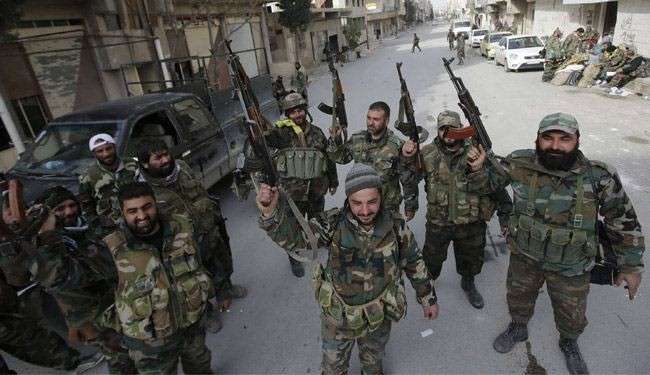
Tentara Suriah
Operasi Tentara Suriah untuk membersihkan elemen-elemen Takfiri terus berlanjut. Informasi terbaru, unit tentara Suriah berhasil menggagalkan serangan kelompok teroris yang mencoba memasuki daerah al-Sheikh Said di kota Aleppo pada Senin, 17/03/14.
Dalam opersai itu, tentara Suriah berhasil membunuh lusinan teroris, melukai dan menghancurkan mobil yang dilengkapi dengan machinegun.
Menurut informasi dari chanel Syria 24, menukil sumber militer melaporkan, unit tentara Suriah menghancurkan kelompok besar teroris dan menghancurkan pertemuan serta sarang mereka terutama di daerah sekitar penjara pusat termasuk, Hayyan, Hreitan, Jbeileh, Free Zone, al-Miselmiyeh, al-Sakhour, al-Halawaniyeh, Jabal Bdour, Tal Shaer, al-Sukkari, al-Oeijeh, Handarat, Bani Zaid, al-Salehyeh, al-Shurfa al-Safra, daerah sekitarnya dari Kweiris, Rasm al-Abboud dan Erbid.
Sumber militer lebih lanjut menambahkan, salah satu komandan bernama Abdul Wahhab al-Dehni yang dikenal dengan Abu Qaoud dilaporkan tewas.
Sementara didalam wilayah Idlib, unit tentara juga menargetkan kamp pertemuan teroris di daerah sekitar wilayah Abu al-Dohour, Om al-Karamil dan Sleijineh. Di wilayah ini, Tentara dan IDF berhasil membunuh sejumlah besar dari elemen-elemen Takfiri. [IT/Onh/Ass]
Berikut Data Statistik "Keberhasilan" Takfiri di Suriah
Islam
Times-
Tapi, Suriah yang berperang melawan terorisme global dukungan
penuh AS, NATO, Turki, Qatar dan Saudi Arabia mengalami kehancuran
struktur dan infrastruktur. Dan itulah keberhasilan yang diraih oleh
elemen-elemen Takfiri binaan asing di Suriah.
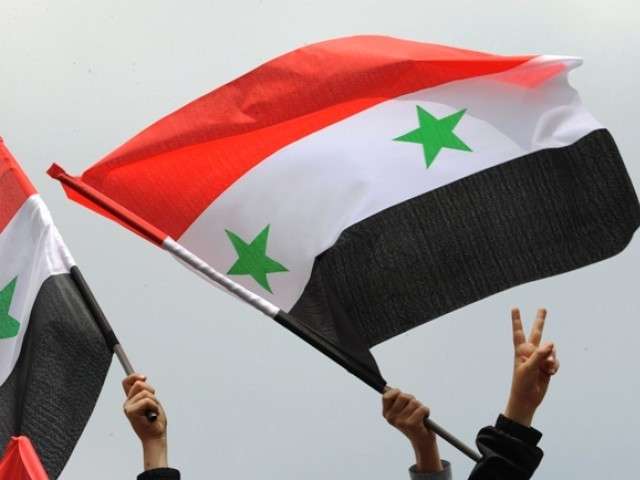
Bendera Suriah
Pendatang haram dari elemen-elemen Takfiri berkedok Jihad yang menghancurkan Suriah dari berbagai negara dunia sudah memasuki tahuh keempat, namun Suriah masih tetap berdiri tegar dan terus meraih kemenangan diberbagai kota.
Tapi, Suriah yang berperang melawan terorisme global dukungan penuh AS, NATO, Turki, Qatar dan Saudi Arabia mengalami kehancuran struktur dan infrastruktur. Dan itulah keberhasilan yang diraih oleh elemen-elemen Takfiri binaan asing di Suriah.
Berikut ini adalah data statistik keberhasilan yang diraih AS, NATO, Turki, Qatar dan Saudi Arabia di negara Arab itu.
1. Sekitar $103 miliar Kerugian ekonomi dan sekitar $25 miliar kerugian Central Bank Reserve;
2. Lebih dari 3 juta Rumah hancur dan 3000 Sekolah luluhlantak;
3. Sekitar 1.000 Sekolah kini berubah menjadi tempat perlindungan para pengungsi;
4. Lebih dari 224 Rumah Sakit hancur, sekitar 1.485 rumah ibadah remuk termasuk Gereja dan Masjid.
Data statistik diatas dinukil dari lama Facebook Arabi Souri pada Senin, 17/03/14. [It/Onh/Ass]
Update: Ribuan Warga Homs Gelar Demo Dukung Tentara Suriah
Islam
Times-
http://www.islamtimes.org/vdcauunea49ni01.h8k4.html
Ribuan massa yang terlibat dalam demo itu menyuarakan dukungan
penuh terhadap prinsip-prinsip nasional dan mendukung Tentara Arab
Suriah, demikian Syria 24 melaporkan.
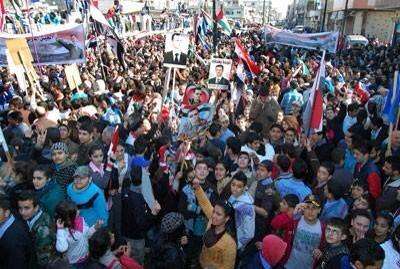
Demo warga Homs, Senin, 17/03/14
Ribuan warga desa al-Manzuol dan al-Mukharam di pedesaan timur Homs
menggelar demo akbar dan turun ke jalan-jalan pada Senin, 17/03/14,
untuk mendukung Tentara Arab Suriah dalam memberangus kelompok Takfiri
bersenjata dukungan asing di negara itu.
Ribuan massa yang terlibat dalam demo itu menyuarakan dukungan penuh terhadap prinsip-prinsip nasional dan mendukung Tentara Arab Suriah, demikian Syria 24 melaporkan.
Sementara itu, Tentara Suriah pada hari Senin terus melanjutkan operasi skala besar dan menargetkan sarang dan kamp pertemuan teroris di beberapa daerah di seluruh negeri.
Operasi itu termasuk di wilayah Homs, yang merupakan sarang elemen-elemen Takfiri al-Qaeda. [IT/Onh/Ass]
Ribuan massa yang terlibat dalam demo itu menyuarakan dukungan penuh terhadap prinsip-prinsip nasional dan mendukung Tentara Arab Suriah, demikian Syria 24 melaporkan.
Sementara itu, Tentara Suriah pada hari Senin terus melanjutkan operasi skala besar dan menargetkan sarang dan kamp pertemuan teroris di beberapa daerah di seluruh negeri.
Operasi itu termasuk di wilayah Homs, yang merupakan sarang elemen-elemen Takfiri al-Qaeda. [IT/Onh/Ass]
Update: Tentara Suriah & Hizbullah Masuki Kota Yabroud
Islam
Times- http://www.islamtimes.org/vdcfe0dmjw6dvya.,8iw.html
www.islamtimes.org - 515 × 403 - Search by image
Peta perang terbaru di Yabroud (Support for Bashar al-Assad from the Balkan People1
https://www.google.com/search?q=image-peta+perang+suriah&client=firefox-a&hs=2Zt&rls=org.mozilla:en-US:official&channel=sb&tbm=isch&tbo=u&source=univ&sa=X&ei=JfMmU56-Fq-YiAf0_4CQAQ&ved=0CEsQsAQ&biw=1024&bih=574#facrc=_&imgdii=_&imgrc=Zys8NOBGJWufMM%253A%3BBC5E3adQwKwmDM%3Bhttp%253A%252F%252Fwww.islamtimes.org%252Fimages%252Fdocs%252F000362%252Fn00362435-s.png%3Bhttp%253A%252F%252Fwww.islamtimes.org%252Fvsnfx1%252Cd.673wma8%252Ciw.html%3B515%3B403
Sementara itu, komandan senior Front al- Nusra dilaporkan tewas
pada Jumat malam, 14/03/14, di pinggiran Yabroud saat terjadi bentrokan
dengan unit tentara Suriah yang didukung oleh para pejuang dari gerakan
perlawanan Hizbullah Libanon.
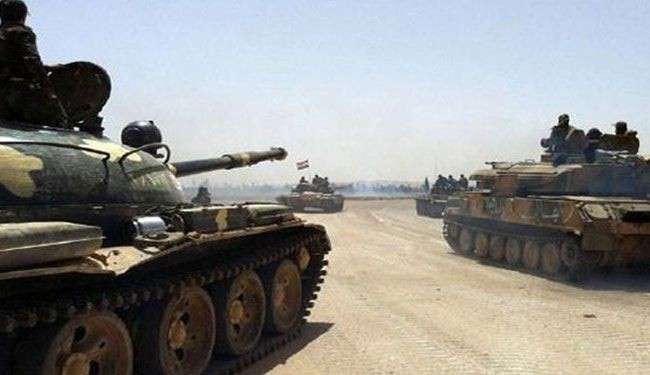
Tentara Suriah
Tentara Suriah dengan bantuan Hizbullah telah memasuki distrik timur kota utama Yabroud, benteng terakhir pemberontak dukungan asing di dekat perbatasan Libanon -utara Damaskus dan bergerak maju ke arah jalan utama kota.
TV al-Mayadeen pada Sabtu sore, 15/03/14 dalam laporannya menayangkan gambar gapura gerbang kota perbatasan yang menunjukkan tentara Suriah sudah memasuki benteng melalui lapangan terbuka menuju pintu gapura kota yang melengkung bertuliskan "Welcome to Yabroud".
Sementara itu, tembakan bom dan meriam terdengar jelas, dan tentara Suriah bersama Hizbullah terus bergerak maju melalui kota strategis yang berfungsi sebagai kunci saluran pasokan pemberontak itu.
Dengan mengontrol wilayah Yabroud itu berarti pasukan pemerintah Suriah akan menyumbat dan mematahkan garis pasokan lintas batas elemen-elemen pendatang haram dari wilayah Libanon.
Kota ini terletak dekat jalan raya yang menghubungkan Damaskus bekas pusat komersial negara, Aleppo di utara dan pantai Mediterania di barat.
Menurut laporan setempat, pertempuran sengit masih terus berlanjut untuk mempertahankan kota utama itu antara pasukan Suriah dan elemen-elemen Takfiri, termasuk rival al- Qaeda dari Front al-Nusra dan Negara Islam Irak dan Syam (ISIS).
Ribuan orang melarikan diri dari Yabroud, sebuah kota yang dihuni sekitar 40.000 sampai 50.000 penduduk yang terletak sekitar 60 kilometer sebelah utara Damaskus. Sejauh ini daerah sekitarnya berhasil dikuasai oleh tentara Suriah beberapa bulan lalu menjelang serangan besar-besaran.
Sementara itu, komandan senior Front al- Nusra dilaporkan tewas pada Jumat malam, 14/03/14, di pinggiran Yabroud saat terjadi bentrokan dengan unit tentara Suriah yang didukung oleh para pejuang dari gerakan perlawanan Hizbullah Libanon.
Komandan Front al-Nusra yang tewas tersebut diidentifikasi bernama Abu Azzam al- Kuwaiti dan merupakan wakil pemimpin Front al-Nusra di Qalamoun, zona pegunungan antara Damaskus dan perbatasan Libanon dekat Yabroud berada. [IT/onh/Ass]
Peta Perang Hizbullah & Suriah di Benteng Takfiri di Yabroud
Islam
Times- http://www.islamtimes.org/vdcjy8etiuqemvz.bnfu.html
Kemenangan yang diraih Hizbulah dan Tentara Suriah juga diakui
oleh kelompok "jihadis" al-Qaida Front al-Nusra pada Jumat, 14/03/14,
yang menyebut bahwa satu posisi penting mereka di Aqaba telah jatuh ke
tangan Tentara dan menyebabkan para "pejuang" mundur ke
pangkalan-pangkalan belakang.
Berikut ini adalah peta perang 14/03/14, di wilayah pos dan benteng Takfiri di Yabroud, perbatasan Suriah-Libanon yang dirilis oleh "The Untold Story" pada Sabtu, 15/03/14.
Dalam peta tersebut, nampak Tentara Suriah yang didukung oleh gerakan Perlawanan Hizbullah Libanon sudah memasuki benteng Takfiri paling akhir di Yabroud dekat perbatasan Libanon, demikian menurut laporan Breaking News dari Damaskus, Sabtu, 15/03/14.
Sejak kemarin, stasiun televisi pemerintah juga mengkonfirmasi informasi tersebut dan melaporkan, "Unit tentara Suriah bergerak maju di daerah Yaboroud dan kini menguasai wilayah timur dan batas timur laut negara."
Serangan Tentara Suriah dan Hizbullah itu menyebabkan hancurnya benteng terakhir Takfiri binaan asing di Suriah.
Kemenangan yang diraih Hizbulah dan Tentara Suriah juga diakui oleh kelompok "jihadis" al-Qaida Front al-Nusra pada Jumat, 14/03/14, yang menyebut bahwa satu posisi penting mereka di Aqaba telah jatuh ke tangan Tentara dan menyebabkan para "pejuang" mundur ke pangkalan-pangkalan belakang.
Bagi Hizbullah, pertempuran memperebutkan kota tersebut sangat penting mengingat
serangan bom bunuh diri yang dilakukan Takfiri di Libanon berasal dari Suriah melalui Arsal seberang perbatasan di Libanon timur menuju kawasan lembah Bekaa.[IT/Onh/Ass]
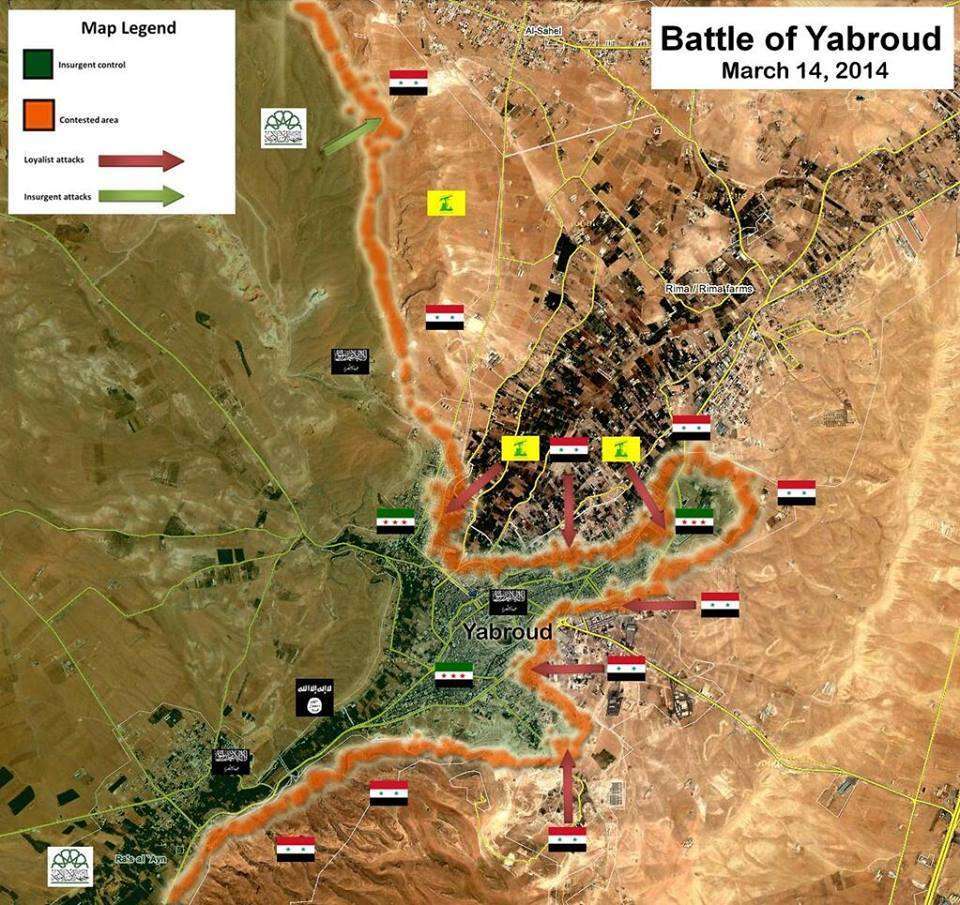
Saudi Arabia Desak Cina Lengserkan Bashar al-Assad
Islam
Times- http://www.islamtimes.org/vdcaoune049ni61.h8k4.html
Pernyataan Abdul Aziz ini jelas membenarkan apa yang telah
dilakukan oleh Saudi dengan membiayai dan secara terbuka mengirim
elemen-elemen Takfiri ke Suriah untuk mengobarkan perang dan pembantaian
di negara itu dalam upaya menggulingkan pemerintahan sah Bashar
al-Assad.
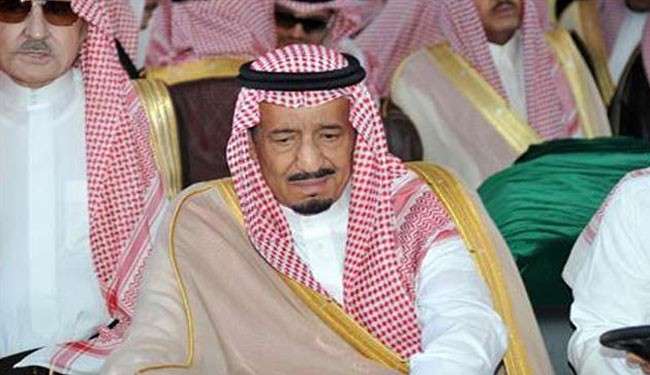
Salman bin Abdul-Aziz
Putra Mahkota Saudi Arabia Salman bin Abdul Aziz meminta masyarakat
internasional untuk menekan Presiden Suriah Bashar al-Assad untuk
menghentikan apa yang ia klaim sebagai pemicu pertumpahan darah di
Suriah.
Pernyataan tidak logis pangeran Saudi yang juga menjabat sebagai perdana menteri pertama dan menteri pertahanan kerajaan Wahabi itu diutarakan pada Jumat kemarin, 14/03/14, dalam pertemuan dengan Wakil Presiden Cina, Li Yuanchao di Beijing, demikian menukil laporan kantor berita Saudi (SPA).
Pernyataan Abdul Aziz ini jelas membenarkan apa yang telah dilakukan oleh Saudi dengan membiayai dan secara terbuka mengirim elemen-elemen Takfiri ke Suriah untuk mengobarkan perang dan pembantaian di negara itu dalam upaya menggulingkan pemerintahan sah Bashar al-Assad.
Sementara media Barat dan lokal berkali-kali menerbitkan dokumen dan kesaksian keterlibatan langsung rezim Saudi sebagai pendukung utama kelompok oposisi dan elemen-elemen Takfiri bersenjata di Suriah.
Sementara itu, sebuah laporan yang terbit pada Kamis kemarin oleh Observatorium Suriah untuk Hak Asasi Manusia, yang juga pendukung utama pemberontak Suriah mendokumentasikan sekitar 146.650 warga Suriah tewas sejak awal pemberontakan tiga tahun lalu dan lebih dari setengah dari korban itu adalah warga sipil.
Pangeran Saudi itu lebih lanjut menyerukan Beijing untuk mendukung kesepakatan komunike Jenewa 2012 yang merekomendasikan pembentukan badan interim Suriah dengan kekuasaan ditangan eksekutif penuh yang menurut klaimnya sebagai solusi politik cepat untuk mengatasi krisis Suriah.
Sejauh ini, Cina dan Rusia menggunakan hak veto mereka di Dewan Keamanan PBB untuk memblokir tiga draft resolusi rekayasa AS yang mengancam akan menjatuhkan sanksi dan militer di Suriah. [IT/Onh/Ass]
Pernyataan tidak logis pangeran Saudi yang juga menjabat sebagai perdana menteri pertama dan menteri pertahanan kerajaan Wahabi itu diutarakan pada Jumat kemarin, 14/03/14, dalam pertemuan dengan Wakil Presiden Cina, Li Yuanchao di Beijing, demikian menukil laporan kantor berita Saudi (SPA).
Pernyataan Abdul Aziz ini jelas membenarkan apa yang telah dilakukan oleh Saudi dengan membiayai dan secara terbuka mengirim elemen-elemen Takfiri ke Suriah untuk mengobarkan perang dan pembantaian di negara itu dalam upaya menggulingkan pemerintahan sah Bashar al-Assad.
Sementara media Barat dan lokal berkali-kali menerbitkan dokumen dan kesaksian keterlibatan langsung rezim Saudi sebagai pendukung utama kelompok oposisi dan elemen-elemen Takfiri bersenjata di Suriah.
Sementara itu, sebuah laporan yang terbit pada Kamis kemarin oleh Observatorium Suriah untuk Hak Asasi Manusia, yang juga pendukung utama pemberontak Suriah mendokumentasikan sekitar 146.650 warga Suriah tewas sejak awal pemberontakan tiga tahun lalu dan lebih dari setengah dari korban itu adalah warga sipil.
Pangeran Saudi itu lebih lanjut menyerukan Beijing untuk mendukung kesepakatan komunike Jenewa 2012 yang merekomendasikan pembentukan badan interim Suriah dengan kekuasaan ditangan eksekutif penuh yang menurut klaimnya sebagai solusi politik cepat untuk mengatasi krisis Suriah.
Sejauh ini, Cina dan Rusia menggunakan hak veto mereka di Dewan Keamanan PBB untuk memblokir tiga draft resolusi rekayasa AS yang mengancam akan menjatuhkan sanksi dan militer di Suriah. [IT/Onh/Ass]
Kekalahan dan Ketakutan Arab Saudi
http://cahyono-adi.blogspot.com/2014/02/kekalahan-dan-ketakutan-arab-saudi.html#more
Dalam pidato Sayyid Hassan Nasrallah di bulan September 2013, Sekjen
Hizbullah tersebut menyerukan kepada Arab Saudi, Turki dan negara-negara
Teluk yang mendukung pemberontak di Suriah untuk merubah sikap mereka.
Telah hampir tiga tahun perang berkecamuk di Suriah dan sudah lebih dari
seratus ribu nyawa melayang, solusi damai harus segera diupayakan
sebelum terlambat.
“I call on Saudi Arabia, Turkey, and other Gulf states to revise your stance. You won’t reach anywhere by relying on a military victory. Put this hatred (for Hezbollah) aside and think with your minds. Think about your interests, the interests of the region, the survival of the region.”
“For two and a half years, they used everything in their disposal to control Syria and they failed. Of course [Hezbollah] are foreigners, we are not Syrian, but [what about] the tens of thousands of foreign fighters who you brought from all over the world? Are they occupying Syria?”
“Saya serukan kepada kalian wahai Arab Saudi, Turki, dan negara-negara Teluk agar kalian merubah sikap. Anda tidak akan mendapatkan apa-apa dengan mengandalkan kekuatan militer. Lupakan sejenak kebencian Anda kepada Hizbullah dan berpikirlah dengan jernih. Pertimbangkanlah tentang kepentingan dan kestabilan kawasan.”
“Telah dua setengah tahun lebih berlalu mereka menggunakan segala sesuatu untuk mengontrol Suriah dan mereka gagal. Memang, kami Hizbullah adalah tentara asing, kami bukan berasal dari Suriah, lalu bagimana halnya dengan puluhan ribu pejuang asing yang Anda kirimkan dari seluruh dunia? Apakah mereka penduduk Suriah?”
Saat itu, kekalahan Arab Saudi masih berupa pernyataan dari sekjen Hizbullah, bukan pengakuan langsung dari pihak Arab Saudi. Namun hari ini kekalahan itu, benar-benar terungkap. Menjelang perundingan Jenewa II, Arab Saudi sangat berambisi bisa merubah kondisi di medan pertempuran. Pemberontak yang didanai Arab Saudi, melancarkan serangan militer ke selatan dan barat Damaskus – termasuk area strategis Qalamoun yang membentang di sepanjang perbatasan Lebanon – serta di Deraa dan Aleppo, namun serangkaian serangan itu tidak sukses karena kokohnya pertahanan Tentara Suriah yang bahu membahu bersama Tentara Pertahanan Nasional dan Hizbullah. Hanya di beberapa titik di Allepo yang berhasil mereka kontrol, namun sama sekali tidak berarti signifikan secara keseluruhan.
Dan sikap terkini Arab Saudi terhadap perundingan Jenewa II yang buntu, dan pertikaian di kubu pemberontak menyiratkan; Arab Saudi kalah ! Ya, meski tidak blak-blakan mengakui kekalahannya, peristiwa demi peristiwa dalam beberapa waktu terakhir ini telah berbicara banyak.
Jihadis menyerahkan diri di al Rayyan
Jihadis menyerahkan diri di al Rayyan
Arab Saudi kini sudah tidak lagi menyebut-nyebut ‘jihad Suriah’ secara detail dan malah cenderung mengabaikan para jihadis di Suriah yang merupakan hasil perselingkuhannya dengan Barat. Disinyalir, ini adalah tekanan dari Amerika Serikat, yang hendak membatalkan kunjungannya ke kerajaan pada bulan Maret. Jika Arab Saudi mengabaikan jihadis (maksudnya tidak lagi membiayai dan menyuplai logistic mereka di Suriah), maka besar kemungkinan jihadis ini akan kembali ke negara asal mereka. Apakah ini sebuah kebetulan dengan fakta adanya 191 jihadis di Al-Rayyan, yang menyerahkan diri dan menerima amnesti yang ditawarkan pemerintah Suriah? Mereka yang menerima pengampunan, diizinkan kembali hidup dengan normal kembali di rumah mereka, dengan persyaratan tidak akan pernah lagi mendukung terorisme di masa mendatang.
Arab Saudi sepertinya mulai ‘mendengar’ seruan Sayyid Hassan Nasrallah untuk merubah sikapnya, dengan mengeluarkan dekrit, sebagaimana yang disampaikan oleh kedutaan di Ankara;
“The Saudis are afraid of an uncontrolled return of those fighters to their country. Two conditions have been set. The first would be a return, under security precautions via the Saudi embassy in Turkey, as mentioned by the ambassador in Ankara on February 6. The second means their dispersal along the frontlines, a repeat of what Saudi fighters in Afghanistan experienced. The following is just some of what is known about the kingdom’s abandonment of its fighters in Syria.”
“Arab Saudi khawatir akan kembalinya para jihadis yang tidak bisa mereka kontrol ke negaranya. Untuk itu, Arab Saudi menyiapkan dua opsi. Yang pertama adalah, jika para jihadis ini akan pulang kampung, maka pihak kemananan Saudi melalui kedubesnya di Turki, akan melakukan pencegahan. (Artinya, para jihadis ini akan ditahan di Turki dan tidak bisa kembali ke Arab Saudi – pen) . Kedua, para jihadis yang masih bertahan di Suriah akan diupayakan untuk ‘disebarkan’ di garis depan pertempuran. (Artinya, jihadis ini diskenariokan agar tewas di dalam pertempuran dengan Tentara Suriah, secara umum, yang berada di garis depan peluang tewasnya jauh lebih besar karena harus berhadapan langsung dengan lawan – pen). Kedua opsi itu, merupakan pertanda bahwa kini Arab Saudi tengah mengulangi apa yang telah pernah mereka lakukan di Afghanistan. Mendukung para jihadis, lalu mencampakkannya.”
Apakah kedua opsi dalam dekrit yang dikeluarkan tanggal 3 Februari tersebut merupakan pertanda bahwa kini mereka mulai bertindak rasional?
Para jihadis di Suriah, sudah tidak perlu lagi ditanyakan kekejamannya. Mungkin hanya di Suriah, di abad ini kita bisa menjumpai seorang manusia memakan hati manusia. Hanya di Suriah kita menemukan permainan sepak bola dengan menggunakan kepala manusia. Hanya di Suriah kita bisa menemukan kepala manusia tergeletak di atas alat pemanggang daging. Gerakan mereka tidak terkontrol, melindas habis nilai-nilai kemanusiaan dan cinta kasih, dan apakah yang akan terjadi jika manusia bengis ini harus kembali ke Arab Saudi? Ini terlalu beresiko dan berbahaya, dan karenanya, Arab Saudi memilih ‘membuang’ mereka.
Bagaimana dengan kondisi psikologis dari jihadis terhadap dekrit tersebut?
Ini memunculkan masalah baru. Mereka yang kecewa karena merasa dicampakkan, kemungkinan akan ‘balas dendam’ kepada kerajaan dengan melakukan aksi terror yang lebih ganas dan mematikan untuk menunjukkan kepada dunia internasional; ‘inilah teroris binaan Arab Saudi’, yang dengan sendirinya akan semakin memperburuk citra arab Saudi di mata dunia.
Dan pasca dikeluarkannya dekrit tersebut, Gedung Putih pun memberikan tanggapan yaitu kepastian kunjungan Obama ke Arab pada bulan Maret mendatang. Dengan begitu, benar bahwa tekanan Amerika merupakan faktor lain akan perubahan sikap Arab Saudi atas Suriah.
Pihak Amerika secara resmi menunjukkan bukti-bukti dukungan Arab Saudi dalam mendukung terorisme di Irak, Suriah, Lebanon, Yaman, dan bahkan Rusia. Berita buruknya, berkas itu sekarang dipegang oleh lembaga internasional, yang dapat menyebabkan kecaman di Dewan Keamanan PBB dan bisa saja akan menobatkan Arab Saudi sebagai state sponsor of global terrorism (negara pendukung terorisme global) yang mungkin akan berefek buruk terhadap kelangsungan rezim Saud.
Mungkinkah Arab Saudi benar-benar mengikuti keputusan Turki yang menarik dukungannya terhadap pemberontak di Suriah, dan malah menandatangani kesepakatan dengan Iran untuk memerangi terorisme? Atau mungkinkah rezim Saud ini sedang memainkan peran ganda? Di satu sisi sepertinya sudah bersikap seharusnya yaitu keluar dari gelanggang konflik dan menghentikan dukungannya kepada para jihadis namun disaat yang sama di sisi lain tengah menyiapkan skenario yang lebih besar seperti yang pernah terjadi di Ghouta? Terlepas dari semua itu, Arab Saudi hari ini sudah cukup ketakutan jika kebrutalan jihadis didikan mereka di Suriah, akan melakukan hal yang sama di kerajaannya cepat atau lambat. Kita masih harus menunggu.
Keterangan: Tulisan asli ada di situs LiputanIslam.com tgl 10 Februari 2014
“I call on Saudi Arabia, Turkey, and other Gulf states to revise your stance. You won’t reach anywhere by relying on a military victory. Put this hatred (for Hezbollah) aside and think with your minds. Think about your interests, the interests of the region, the survival of the region.”
“For two and a half years, they used everything in their disposal to control Syria and they failed. Of course [Hezbollah] are foreigners, we are not Syrian, but [what about] the tens of thousands of foreign fighters who you brought from all over the world? Are they occupying Syria?”
“Saya serukan kepada kalian wahai Arab Saudi, Turki, dan negara-negara Teluk agar kalian merubah sikap. Anda tidak akan mendapatkan apa-apa dengan mengandalkan kekuatan militer. Lupakan sejenak kebencian Anda kepada Hizbullah dan berpikirlah dengan jernih. Pertimbangkanlah tentang kepentingan dan kestabilan kawasan.”
“Telah dua setengah tahun lebih berlalu mereka menggunakan segala sesuatu untuk mengontrol Suriah dan mereka gagal. Memang, kami Hizbullah adalah tentara asing, kami bukan berasal dari Suriah, lalu bagimana halnya dengan puluhan ribu pejuang asing yang Anda kirimkan dari seluruh dunia? Apakah mereka penduduk Suriah?”
Saat itu, kekalahan Arab Saudi masih berupa pernyataan dari sekjen Hizbullah, bukan pengakuan langsung dari pihak Arab Saudi. Namun hari ini kekalahan itu, benar-benar terungkap. Menjelang perundingan Jenewa II, Arab Saudi sangat berambisi bisa merubah kondisi di medan pertempuran. Pemberontak yang didanai Arab Saudi, melancarkan serangan militer ke selatan dan barat Damaskus – termasuk area strategis Qalamoun yang membentang di sepanjang perbatasan Lebanon – serta di Deraa dan Aleppo, namun serangkaian serangan itu tidak sukses karena kokohnya pertahanan Tentara Suriah yang bahu membahu bersama Tentara Pertahanan Nasional dan Hizbullah. Hanya di beberapa titik di Allepo yang berhasil mereka kontrol, namun sama sekali tidak berarti signifikan secara keseluruhan.
Dan sikap terkini Arab Saudi terhadap perundingan Jenewa II yang buntu, dan pertikaian di kubu pemberontak menyiratkan; Arab Saudi kalah ! Ya, meski tidak blak-blakan mengakui kekalahannya, peristiwa demi peristiwa dalam beberapa waktu terakhir ini telah berbicara banyak.
Jihadis menyerahkan diri di al Rayyan
Jihadis menyerahkan diri di al Rayyan
Arab Saudi kini sudah tidak lagi menyebut-nyebut ‘jihad Suriah’ secara detail dan malah cenderung mengabaikan para jihadis di Suriah yang merupakan hasil perselingkuhannya dengan Barat. Disinyalir, ini adalah tekanan dari Amerika Serikat, yang hendak membatalkan kunjungannya ke kerajaan pada bulan Maret. Jika Arab Saudi mengabaikan jihadis (maksudnya tidak lagi membiayai dan menyuplai logistic mereka di Suriah), maka besar kemungkinan jihadis ini akan kembali ke negara asal mereka. Apakah ini sebuah kebetulan dengan fakta adanya 191 jihadis di Al-Rayyan, yang menyerahkan diri dan menerima amnesti yang ditawarkan pemerintah Suriah? Mereka yang menerima pengampunan, diizinkan kembali hidup dengan normal kembali di rumah mereka, dengan persyaratan tidak akan pernah lagi mendukung terorisme di masa mendatang.
Arab Saudi sepertinya mulai ‘mendengar’ seruan Sayyid Hassan Nasrallah untuk merubah sikapnya, dengan mengeluarkan dekrit, sebagaimana yang disampaikan oleh kedutaan di Ankara;
“The Saudis are afraid of an uncontrolled return of those fighters to their country. Two conditions have been set. The first would be a return, under security precautions via the Saudi embassy in Turkey, as mentioned by the ambassador in Ankara on February 6. The second means their dispersal along the frontlines, a repeat of what Saudi fighters in Afghanistan experienced. The following is just some of what is known about the kingdom’s abandonment of its fighters in Syria.”
“Arab Saudi khawatir akan kembalinya para jihadis yang tidak bisa mereka kontrol ke negaranya. Untuk itu, Arab Saudi menyiapkan dua opsi. Yang pertama adalah, jika para jihadis ini akan pulang kampung, maka pihak kemananan Saudi melalui kedubesnya di Turki, akan melakukan pencegahan. (Artinya, para jihadis ini akan ditahan di Turki dan tidak bisa kembali ke Arab Saudi – pen) . Kedua, para jihadis yang masih bertahan di Suriah akan diupayakan untuk ‘disebarkan’ di garis depan pertempuran. (Artinya, jihadis ini diskenariokan agar tewas di dalam pertempuran dengan Tentara Suriah, secara umum, yang berada di garis depan peluang tewasnya jauh lebih besar karena harus berhadapan langsung dengan lawan – pen). Kedua opsi itu, merupakan pertanda bahwa kini Arab Saudi tengah mengulangi apa yang telah pernah mereka lakukan di Afghanistan. Mendukung para jihadis, lalu mencampakkannya.”
Apakah kedua opsi dalam dekrit yang dikeluarkan tanggal 3 Februari tersebut merupakan pertanda bahwa kini mereka mulai bertindak rasional?
Para jihadis di Suriah, sudah tidak perlu lagi ditanyakan kekejamannya. Mungkin hanya di Suriah, di abad ini kita bisa menjumpai seorang manusia memakan hati manusia. Hanya di Suriah kita menemukan permainan sepak bola dengan menggunakan kepala manusia. Hanya di Suriah kita bisa menemukan kepala manusia tergeletak di atas alat pemanggang daging. Gerakan mereka tidak terkontrol, melindas habis nilai-nilai kemanusiaan dan cinta kasih, dan apakah yang akan terjadi jika manusia bengis ini harus kembali ke Arab Saudi? Ini terlalu beresiko dan berbahaya, dan karenanya, Arab Saudi memilih ‘membuang’ mereka.
Bagaimana dengan kondisi psikologis dari jihadis terhadap dekrit tersebut?
Ini memunculkan masalah baru. Mereka yang kecewa karena merasa dicampakkan, kemungkinan akan ‘balas dendam’ kepada kerajaan dengan melakukan aksi terror yang lebih ganas dan mematikan untuk menunjukkan kepada dunia internasional; ‘inilah teroris binaan Arab Saudi’, yang dengan sendirinya akan semakin memperburuk citra arab Saudi di mata dunia.
Dan pasca dikeluarkannya dekrit tersebut, Gedung Putih pun memberikan tanggapan yaitu kepastian kunjungan Obama ke Arab pada bulan Maret mendatang. Dengan begitu, benar bahwa tekanan Amerika merupakan faktor lain akan perubahan sikap Arab Saudi atas Suriah.
Pihak Amerika secara resmi menunjukkan bukti-bukti dukungan Arab Saudi dalam mendukung terorisme di Irak, Suriah, Lebanon, Yaman, dan bahkan Rusia. Berita buruknya, berkas itu sekarang dipegang oleh lembaga internasional, yang dapat menyebabkan kecaman di Dewan Keamanan PBB dan bisa saja akan menobatkan Arab Saudi sebagai state sponsor of global terrorism (negara pendukung terorisme global) yang mungkin akan berefek buruk terhadap kelangsungan rezim Saud.
Mungkinkah Arab Saudi benar-benar mengikuti keputusan Turki yang menarik dukungannya terhadap pemberontak di Suriah, dan malah menandatangani kesepakatan dengan Iran untuk memerangi terorisme? Atau mungkinkah rezim Saud ini sedang memainkan peran ganda? Di satu sisi sepertinya sudah bersikap seharusnya yaitu keluar dari gelanggang konflik dan menghentikan dukungannya kepada para jihadis namun disaat yang sama di sisi lain tengah menyiapkan skenario yang lebih besar seperti yang pernah terjadi di Ghouta? Terlepas dari semua itu, Arab Saudi hari ini sudah cukup ketakutan jika kebrutalan jihadis didikan mereka di Suriah, akan melakukan hal yang sama di kerajaannya cepat atau lambat. Kita masih harus menunggu.
Keterangan: Tulisan asli ada di situs LiputanIslam.com tgl 10 Februari 2014
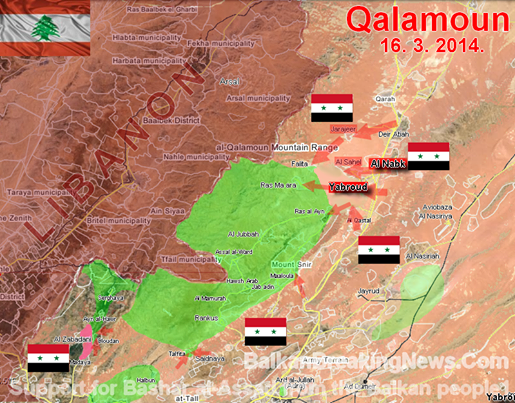
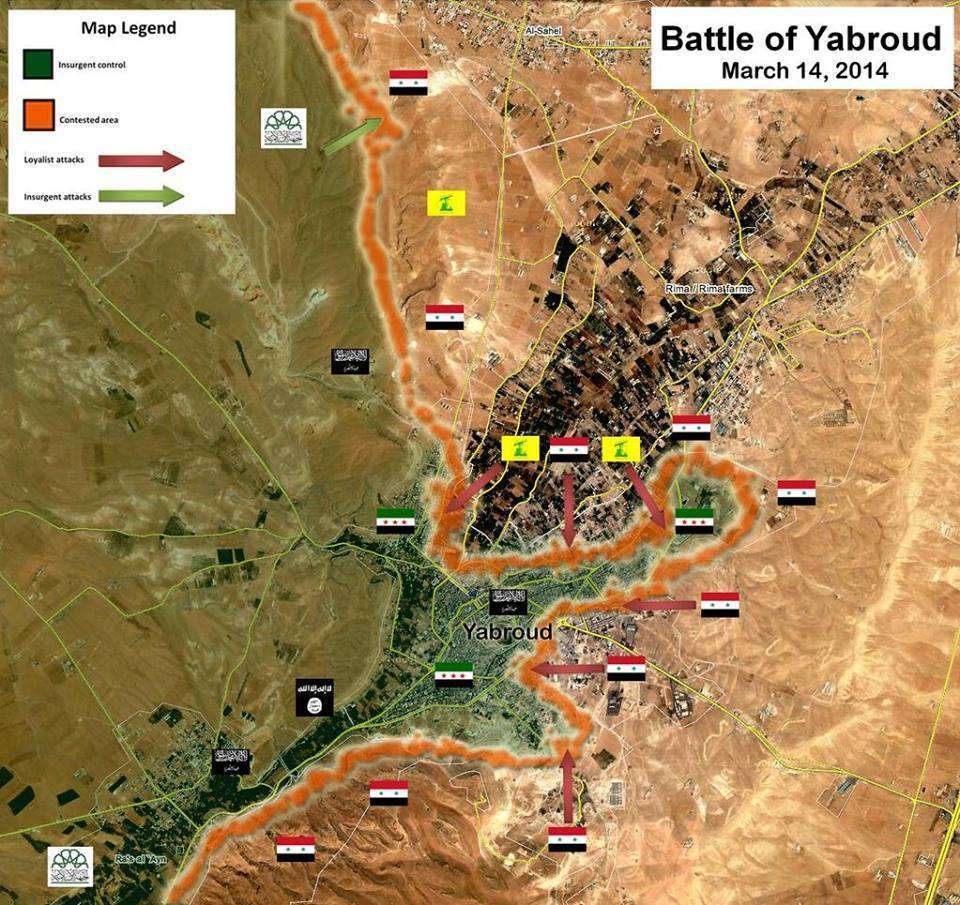

Tidak ada komentar:
Posting Komentar